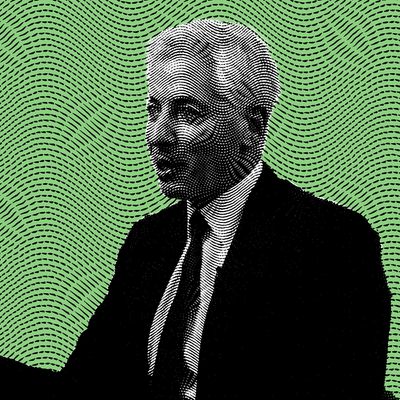

Photo-Illustration: Intelligencer; Photo: Getty Images
On Wednesday, Bill Ackman, the billionaire investor, pulled the plug on a high-profile deal that was, at one time, supposed to be a $25 billion investment jackpot. Ackman is the CEO of Pershing Square, a hedge fund well known on Wall Street, who’s had a storied, decadeslong career as an investor — whether the trades were successful (in the case of his short on the market prior to COVID lockdowns) or not (with his bet against Herbalife, which became a proxy war against fellow billionaire Carl Icahn).
But over the past year or so, he has become far more noted for his crusades, mostly on X, against the woke left, antisemitism, Harvard, and corporate diversity programs. It won him legions of fans, with more than 1.3 million followers on Elon Musk’s platform. In turn, he was looking to turn that newfound notoriety into a new fund, available for the public to invest in. It would have been equivalent to Berkshire Hathaway — complete with splashy annual meetings and a way to get his take into the world. Originally, it was supposed to bring in $25 billion in new capitol for the investor.
Then, over recent weeks, it shrank. Over the past few days, it collapsed entirely, with Ackman officially calling off the initial public offering of Pershing Square USA, a similarly named fund that would have mimicked his hedge fund, only days away from an expected debut on the New York Stock Exchange. At issue, he said, was a “transaction structure” problem, and he vowed to come back to Wall Street with another, more investor-friendly version. It also came after a chaotic rollout in which an investor letter that was supposedly meant to be private was made public and Ackman struggled later in the process to raise 10 percent of his initial goal. Even a generous reading has Ackman failing at least twice: on figuring out what the market wants and how much of this new entity he could reasonably sell.
The collapse of Pershing Square USA is not the first time that Ackman has whiffed on a new investment fund. In 2020, he tried to get in on the SPAC craze, raising $4 billion — the most ever — for a special purpose acquisition company. But he did so only to return the money two years later, apparently unable to find a suitable deal. The following year, he launched another buyout fund that could do a deal of at least $1.5 billion during the next ten years, but that hasn’t gone anywhere, either. PSUS, as the newest fund was known, would have been the most straightforward of his recent spate of funds.
Ackman first announced Pershing Square USA in February. He was explicit that it was a play that sought to capitalize on his “brand-name profile.” PSUS was supposed to be huge — about 40 times larger than comparable funds, according to Semafor’s Liz Hoffman. The heart of the idea was that it would be, essentially, a new source of investment capital for Ackman, amid all his sudden notoriety, as he continues to make deals and trades. It would trade like an exchange-traded fund but had a slightly different structure that made it more susceptible to being valued more or less than the sum of all its investments. The basic pitch was that his newfound fans would be able to enjoy Pershing Square–style returns without some of the high fees that hedge funds tend to charge their clients. (Of course, if Ackman’s trades went bust, the investors could lose money too.) And there was plenty of reason to think that a deal like this could happen. In June, Ackman sold a tenth of Pershing Square — his main hedge fund — for a little more than $1 billion. He had plans, he said, to IPO that fund sometime next year or in 2026.
For months, there was no indication that Ackman would have trouble raising money for PSUS. Then the fundraising very quickly stalled. Despite Ackman’s professed focus on everyday investors, the kind of people who would follow him on X, PSUS faltered during negotiations with rich, sophisticated investors — hedge funds, mutual funds, and pensions. Before an IPO, a company negotiates with the investors who will buy their shares directly, basically haggling over how much to invest and at what price. By July 24, Ackman had talked with 150 investors. The fundraising goal had fallen to $10 billion. But he had some big names that wanted to give him around $200 million — Putnam, a mutual-fund company; the Teachers Retirement System of Texas, a pension; and Seth Klarman’s hedge fund, Baupost Group.
The public knows because the next day, the letter in which he told investors all this was made public. It appears Ackman had mistakenly disclosed enough information that it would trigger legal requirements under stock sales rules, though he said he “did not believe that it would require public disclosure,” according to a filing associated with it. But the disclosures didn’t sit well with financiers. The next day, Ackman put out a press release to “clarify” that the IPO was “proceeding.” Soon after, Klarman pulled out. On Wednesday, after the demand had shrunk to $2 billion, Ackman called it off.
On Thursday, Ackman filed paperwork withdrawing the IPO. He has vowed to launch another version of his fund, saying that he will come up with a new “transaction structure” that Wall Street will like better. As of Thursday, he hasn’t provided any details on how.
Source link




